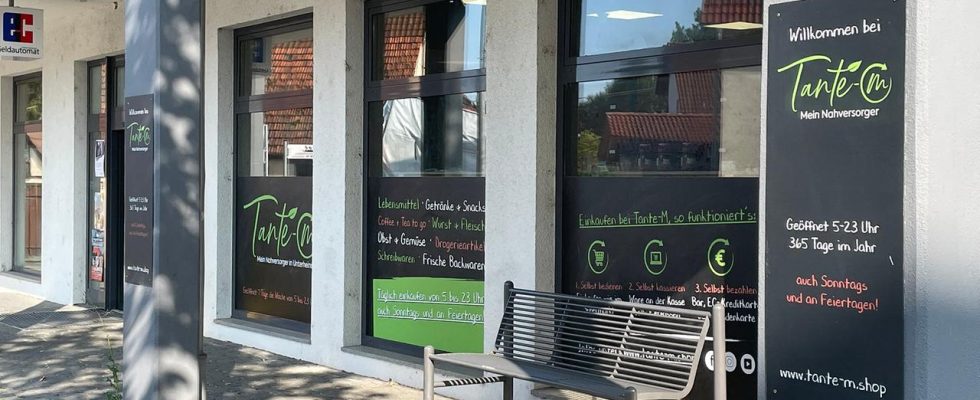If the city dweller runs out of bread on a Sunday, he can easily find supplies. It’s different in the country – where self-service supermarkets can help. But because of the Sunday protection, there is criticism.
Christian Maresch sees himself as the savior of local supply in rural areas. He has now opened more than 40 small self-service supermarkets in Baden-Württemberg, Bavaria and Rhineland-Palatinate. Without staff, with self-service checkouts where customers scan and pay for the goods themselves.
The offer includes rather the basic needs; the shops are mostly in small communities where far and wide there is no shop, inn or bakery to be found. The shops are called “Tante-M”, based on the good old corner shops in the village. Maresch is not the only provider, but currently by far the largest in the southwest.
“We see ourselves as walk-in machines,” says the managing director in an interview tagesschau.de. Maresch only needs staff to replenish the shelves several times a week and for cleaning. Otherwise, the shops function completely without people – 365 days a year, daily from 5 a.m. to 11 p.m. They are closed at night to prevent vandalism and theft. But it is precisely these opening hours that have now brought the “Alliance for the Sunday off” to the table.
In the “Tante-M” shop in Trillfingen you can also buy chips, pasta or rice on Sundays.
Opponents see Sunday protection undermined
Allianz is a nationwide alliance of church and trade union organizations that has set itself the task of maintaining the legally prescribed Sunday rest. The “Tante-M” shops are a thorn in the side of the Allianz subsidiary in Baden-Württemberg.
“The constitutionally protected Sunday is being softened by the shops,” says Wolfgang Krüger from the ver.di trade union, which is part of the alliance. He calls on politicians to ban the “Tante-M” shops from opening on Sundays and public holidays. But why actually? Personnel who would have to work on Sundays, i.e. the very own clientele of a union, are not affected by the opening at all.
“First of all, we are concerned with the legal issue,” says Krüger. The shop opening law in Baden-Württemberg now sets clear rules that everyone must adhere to. Cities too, for example, when it comes to Sunday shopping. According to the legal opinion of the Alliance for the Free Sunday, the “Tante-M” shops are sales outlets that, according to the law, must generally be closed on Sundays and public holidays.
The second concern: Other stores may be at a disadvantage because their non-staffed competitors are open on Sundays. A concern that “Tante-M” managing director Maresch cannot understand. “We’re in these places precisely because we’re the only remaining local supplier far and wide,” he says.
It’s also about policy issues
For the opponents, however, it is more about the fundamental question anyway. “We are experiencing that the Sunday protection is getting more and more into trouble,” says ver.di representative Krüger. Even if there are no employees in the “Tante-M” shops, the impression is created among the population that shops are open. Shops with staff could at some point demand to be allowed to open. Sunday as an institution is being softened more and more. In his opinion, it is therefore completely sufficient if the self-service supermarkets in the country are open from Monday to Friday.
Entrepreneur Maresch disagrees. Sunday was the day of the week with the highest sales and Good Friday was even the day of the year with the highest sales. He also concedes that his shops are not purely local suppliers, but are also used by tourists or for spontaneous errands, especially on Sundays and public holidays. But his math is simple: without the high-sales Sundays, many of his shops would no longer be profitable as local suppliers during the week, and he would have to close them – with the result that there would then be no more local suppliers at all, especially to the disadvantage of older people People.
Markets are legally a gray area
Perhaps that is the reason why politicians have so far been reluctant to do so. The local supply in rural areas is a big problem and a recurring issue in election campaigns. Great hopes rest on self-service supermarkets. The Ministry of Economics in Baden-Württemberg answers the question of how it deals with the complaints of the critics that one is in contact with all actors. Many reasons even suggest that automated supermarkets actually have to close on Sundays and public holidays according to the applicable law.
But little has happened even several months after the first attack by the opponents. On the contrary: the self-service shops get backing from the state parliament. Green parliamentary group leader Andreas Schwarz emphasizes that the self-service shops without staff ensure basic supplies. Tobias Vogt, SME policy spokesman for the CDU, sees it as a plus for the quality of life in rural areas. The Sunday protection should not be ignored. But when clarifying legal issues, one must “keep an eye on enabling rather than preventing,” says Vogt im SWR.
And so the discussion in Baden-Württemberg is no longer just about the question of whether in Großerlach, Kleiningersheim, Weiltingen or Kurtscheid a “Tante-M” market can open on Sundays without staff and without serious competitors in the area. Ultimately, it is about what is more important to society: Sunday protection or secure local supply in rural areas.

